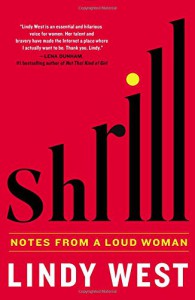Currently reading




 4
4
loved it, despite...

| ...the sexism which I have talked myself into believing the author intentionally wrote it that way to create the verisimilitude of the finance world. |
 5
5

The tragedy of books like these is that the readers are basically the choir to which the author sings.
 2
2
what happens when a group discusses a book about women? mansplaining!

I read this as part of a bookclub discussion. The book was selected by a lovely woman who fled Iran 24 years ago, and had lived through the revolution, war and economic sanctions against her country. She said she started reading it a year ago but it was just too emotional and so she thought with the support of the bookclub she could get through it. I was grateful for her choice as this was interesting, informative and a unique perspective on the topic. Instead of a classic 'book report' I have decided to share the bookclub discussion experience.
So, the group met yesterday evening, 9 women and 5 men. The group on the whole is well educated, well informed, well read and generally progressive. After everyone has takes a turn to give their impression of the book, open discussion follows. And guess what followed? MANSPLAINING! The book was about women in Islamic middle eastern cultures, told through very personal stories. Some were positive, but many very illustrative of how women are subjugated, abused and repressed. While political and economic policy are relevant to such a book, this wasn't a book about politics or policy. Nevertheless, a subset of the men in the room hijacked the discussion into that. When the woman from Iran (who lived through the revolution) explained that Iranian revolution in 1979 was not entirely rooted in the rise Islamic fundamentalism, she was corrected. When she described the economic disparity in Iran (no middle class) she was corrected. When I brought up my opinion that it's not the Islamic faith that leads to repression of women, but rather patriarchal cultural practices, I was corrected. The irony of the whole situation was not lost on me, nor was it lost on many of the other women in the room.
To be fair, these men aren't misogynists and they are probably sympathetic to feminist causes. But they have also been raised to be more assertive and are better skilled at inserting their opinions into the discussion. They may not consciously discount a woman' s opinion, but they probably are oblivious to their subconscious biases. Even in 'so called' enlightened western culture, in one of the most liberal cities in America, you can find micro aggressions against women in the context of a book discussion about the oppression of Islamic women. ¯_(ツ)_/¯
Now, turn a subconscious bias against women into one that is culturally sanctioned through religious interpretation and you have the plight of many many Islamic women in the Middle East. Even though this book is 20+ years old and not without flaws, it is informative a worth a read.
 5
5
 1
1
brain surgery is done by humans, not gods

Although I was sorry there wasn't a chapter featuring deep brain stimulation, this is the brain surgery book I hoped for! The memoir isn't particularly well structured and the stories don't always have a well defined arc, but that doesn't matter. The author is a brain surgeon for god sake, not a Pulitzer winning author. What is revealed is the challenging world of high risk surgery carry high levels of risk and reward. Surgeons are notorious for having big egos, and Dr. Henry Marsh is no exception. His disdain for hospital and healthcare management was as evident as his compassion for his patients. He candidly talks about his struggles dealing with less than sympathetic patients. Also, kudos to the best temper tantrum I've seen in a book (following a botched job performed by a trainee).
 2
2
rookie kingmaker

 2
2
becuase sometimes surrendering feels so good

Very sage advice from an author who seems to get me. Somehow, I feel vindicated by my chaotic Evernote notebook stack and my chronically low RescueTime scores. I will never again be embarrassed by my drunken tweets because they are the stuff of life. I will embrace the fact that my baristas know I eat a chocolate brownie for breakfast everyday, because dammit, I'm a champion!
 5
5
recommended for those in abusive relationship who need practical advice an understanding advocate

An excellent practical guide for those in abusive relationships. It's less clinical and jarring than his first book [book:Why Does He Do That?: Inside the Minds of Angry and Controlling Men|224552] and likely easier for those in abusive relationships to read. While he doesn't sugar coat things or give false hope, Mr. Bancroft is an empathetic voice and understands the difficulty and plight of those in abusive relationships.
 3
3
what happens in Vegas...

Really good writing with a graphic novel layered in, creating a story within a story. I have recently enjoyed a few graphic novels, and while they are not my favorite medium, I do appreciate them. That said, I really liked this author's writing and I would really like to experience it as just the written word.
 2
2

 1
1
these gentlemen have grown on me

At #3 in the gentlemen's series, this while not the brightest star of the bunch. However I have grown fond of the Ricardians and thoroughly enjoyed the story or Richard and David.
 3
3
The brute and the Tory

 2
2

 ISIS dildo merch available at http://www.paulcoombs.co.uk/
ISIS dildo merch available at http://www.paulcoombs.co.uk/Black Flags methodically lays out the background and rise of what we now know as ISIS, or the Islamic State. It's not because Islam is a flawed religion. It's not because Middle Eastern cultures are flawed. Much of the blame points back at American arrogance and thoughtlessness, in particular the decision to take on regime change and nation building in Iraq. The author makes the case that ISIS emerged from AQI lead by Jordanian al Zarqawi and a post invasion Iraq with all the American foibles created a fertile breeding ground for such a movement.
The first two thirds of the book covered al Zarqawi's background, the US invasion of Iraq, the subsequent insurgency and Zarqawi's death in 2006. The last third covers the "Arab Spring", Syria and the emergence of the ISIS brand. Unfortunately the ending is somewhat arbitrary as the story of ISIS is an ongoing one. Such is the case with books that feature current events. It does however give an excellent historical perspective of the past 15-20 years, and hopefully someday soon we will be able to read a true post-game analysis by this author. In the mean time, I will seek out his work at the Washington Post and other news outlets.
If you really want to understand how such a thing as ISIS can even exist, this is the book to read.
2016 reading challenge checks the box for 13. A non-fiction book you learn something new from (include self-help). I learned a fuckton from this book.
Thanks to Vivian and Emma for the cute-therapy they provided to counter program this difficult subject matter.
 1
1
When Breath Becomes Air
 For some stupid reason stupid being me not reading blurbs I thought I was going to read about brain surgery. I thought I was going to learn about a topic of special interest to me written for the the non-brain surgeon reader. That is not this book. This is book is The Last Lecture Neurosurgeon Edition. For what it was, it was fine and I cried.
For some stupid reason stupid being me not reading blurbs I thought I was going to read about brain surgery. I thought I was going to learn about a topic of special interest to me written for the the non-brain surgeon reader. That is not this book. This is book is The Last Lecture Neurosurgeon Edition. For what it was, it was fine and I cried.
A Fashionable Indulgence
 This author manages to write historical mm romance without making the main characters tragic or doomed. Also a plus, I get to learn about a slice of history in a easy to digest and entertaining manner. Well done.
This author manages to write historical mm romance without making the main characters tragic or doomed. Also a plus, I get to learn about a slice of history in a easy to digest and entertaining manner. Well done.
 1
1
The Story of the Lost Child: The fourth and final Neapolitan novel.
 Holy cannoli , that was incredible. Shit got real with this fourth and final installment of the Neapolitan Novels series. The violence, thugs, and corrupted power structures in Naples were featured through all four books, but view and perspective evolves. Initially it is seen from an child's perspective, with a very basic understanding and acceptance. Then from the youthful idealists' perspective, where there was still belief that one could rise above and make a difference. In the third book, you get the perspective of denial and avoidance as Lena moves away and Lila strikes out on her own. Finally, this book gives the perspective of a fully formed adult, facing up to it all with an element of resignation. You can take the Neapolitan out of Naples, but you can't take Naples out of the Neapolitan.
Holy cannoli , that was incredible. Shit got real with this fourth and final installment of the Neapolitan Novels series. The violence, thugs, and corrupted power structures in Naples were featured through all four books, but view and perspective evolves. Initially it is seen from an child's perspective, with a very basic understanding and acceptance. Then from the youthful idealists' perspective, where there was still belief that one could rise above and make a difference. In the third book, you get the perspective of denial and avoidance as Lena moves away and Lila strikes out on her own. Finally, this book gives the perspective of a fully formed adult, facing up to it all with an element of resignation. You can take the Neapolitan out of Naples, but you can't take Naples out of the Neapolitan. In my review of the first book, My Brilliant Friend, I ironically mention that it was a woman centered story without being feminist themed. Strike that, this series is a modern historical feminist masterpiece cleverly disguised as an easy to read soap opera. If you are intrigued, be forewarned, you should commit to reading all four books.
The series has two protagonists, Elena Grecco (aka Lenuccia or Lenù) and Raffaella Cerullo (aka Lina or Lila). Both are intelligent, brilliant and unexpected. Lenù becomes educated, a writer and associates with academics and intellectuals. For all her ostensible accomplishments, Lenù manages to make questionable life decisions. While she wasn't bratty or a diva in any way, Lenu was quite selfish and deeply insecure. Lila is forced to leave school after the 5 grade, and somehow manages to simultaneously embrace and reject all the trappings of the 'neighborhood' (aka Naples). Unlike Lenù, Lila doesn't have an insecure bone in her body, yet she will declare herself stupid. There is something fundamentally off with Lila, to the point where I sometimes thought she might have some sort of a personality disorder. In any case, their stories are artfully intertwined and this last book brings everything full circle.
Like all the contradictions that embody Lina and Lenù, this last edition brings it all to a definite conclusion while leaving many questions unanswered.



